| 2003 |

|
YEAR BOOK |
Royal Irish Academy
|
New Members of the Royal Irish Academy
|
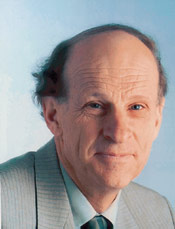
Dr John Fuller Atkins (Science Foundation Ireland), born in Dunmanway, Co. Cork, in 1944, is a very distinguished molecular geneticist with an outstanding international reputation for his major contributions to our understanding of the way in which the genetic code is decoded. While a PhD student in TCD, he was the co-discoverer of mutant non-triplet reading of the genetic code. He elucidated some of the mutant mechanisms while working in the Biochemistry Department in UCC. In the University of Utah, he discovered several attributes of Recoding - reprogrammed genetic decoding. He is co-editor of the book, The RNA World, which is now in its second edition. He was one of the first two Irish scientists elected to the European Molecular Biology Organization (EMBO) and is currently Director of Biology and Biotechnology at Science Foundation Ireland.
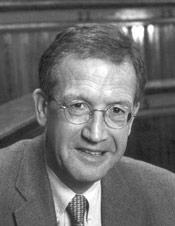
Professor Michael Bevan Jones (TCD), born in 1946 is Professor of Botany at Trinity College, Dublin. His main research interests are in climate-plant interactions, particularly the effects of climate on photosynthesis, growth and productivity. He is internationally recognised for his research on plants with C4 photosynthesis, their adaptation to temperate climates and their potential uses as energy crops. His current work has focused on the effects of changing climate, and in particular the effects of rising levels of atmospheric carbon dioxide, on agricultural and natural grasslands. He is Botanical Editor of Biology and Environment, Proceedings of the Royal Irish Academy. As co-ordinator of a number of EU-projects and a partner in many others, he collaborates with many institutions worldwide including INRA in France, CEH in the UK, Cesia in Italy, GSF in Germany and INPA in Brazil.
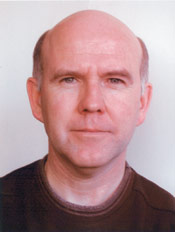
Professor John McGilp was born in Langbank, Scotland in 1951. He started his schooling in Singapore before returning to the UK, where he attended Carlisle Grammar School in the North of England. He read Chemistry at New College Oxford, and then moved to the Department of Physics, University of Liverpool, where he obtained a PhD in 1976 on "Studies of Solid State Auger and Photoemission Spectra using Soft X-ray Excitation". He was appointed Lecturer in the Department of Physics, Trinity College, Dublin in 1977 where, over a number of years, he built up an experimental research group in surface and interface physics. He has established an international reputation in the area of the surface optical response, where he is one of the leaders in Europe of the emerging field of "epioptics". He has over 100 peer-reviewed publications, and is extensively cited in the literature. His current research is concentrated on understanding and exploiting both the linear and nonlinear optical response of metallic and semiconducting surfaces.
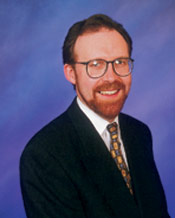
Dr Anthony Moran (NUIG), born in 1960, is a Senior Lecturer in the Department of Microbiology, National University of Ireland, Galway. His research, for which he has an international reputation, is focused on microbial biochemistry and glycobiology. He has combined biochemical and structural studies of bacterial-derived molecules with investigations of how these molecules interact with the host, and has gained novel insights into microbial activation of the immune system and defensive mechanisms. His basic science studies in glycobiology on sugar-related molecules of bacterial and human origin have led to a new appreciation of their role in disease development, including autoimmunity, and are of relevance to the fields of Bacteriology, Infectious Diseases, Immunology, Toxicology, Neurology and Gastroenterology.
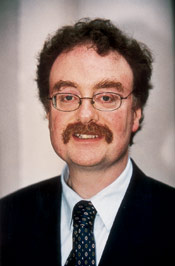
Professor Fionn Murtagh (QUB), born in Dublin in 1954, is Professor in the School of Computer Science in Queen's University Belfast. His research involves the application of advanced statistical methods and clustering algorithms in pattern recognition problems in the areas of Astronomy, Medicine and Communications. He is internationally recognised for the quality of his research, having held posts in Germany, France, Italy and USA. He is one of the leading European computer scientists, as reflected in his editorship of the prestigious computer science journal, the Computer Journal. Earlier in his career he represented Ireland on the EU Joint Research Centre and the Space Science Department of the European Space Agency. He is currently a member of the National Committee for Astronomy and Space Research.
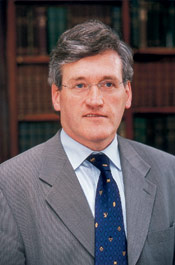
Professor Fergal O'Gara (UCC), born in 1949, is Professor of Microbiology and Director of the BIOMERIT Research Centre at National University of Ireland, Cork. He is one of Ireland's best molecular biologists in the field of plant and soil microbes and has a strong international profile. During his career, he has become a leading expert on nitrogen fixation and later iron assimilation and antibiotic production. He has produced a formidable body of work in a competitive field, which represents a remarkable intellectual achievement. Since 1993 he has played a number of major roles at European level, including: Director, EU Biotechnology IMPACT Project; Vice-president of EU Scientific Committee on Plants; Chairperson of the EU Scientific Committee on GMOs; Chairperson of EU Life Sciences Panel; elected member of European Environmental Research Organisation (EERO). He has published over 140 peer-reviewed research papers in international journals and was awarded a DSc in 1991 by the National University of Ireland for his published works.
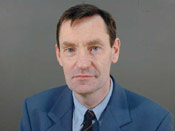
Professor Patrick Shannon (UCD), born in 1952, is an authority on Irish offshore Geology and has been Head of the Department of Geology in UCD since 1999. He has been the driving force in highlighting the importance of Irish continental shelf geology to a wide international audience. He has used Irish basins in a fundamental generic way to test models of depositional systems, structural evolution and petroleum generation that are applicable globally. His many and diverse publications reflect this breath and depth of contribution. Prior to joining the staff of UCD in 1983, he worked at the University of Newcastle upon Tyne, the Geological Survey of Ireland and the Petroleum Affairs Division of the Department of Energy. In UCD he set up and leads the Marine and Petroleum Geology Research Group. He is a member of the National Committee for Geology and of the National Committee for Geodesy and Geophysics.
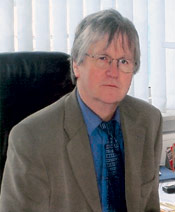
Professor Malcolm Smyth (DCU), born in Ballymoney, Co. Antrim, in 1951, is Professor of Analytical Chemistry and Dean of the Faculty of Science and Health at Dublin City University. His research has spanned a wide variety of areas of biological, industrial and environmental importance, such as the development of novel bio-sensor technology based on enzymes and antibodies, fundamental studies of the mode of action of industrial sealants, and the chemical analysis of important compounds in various foodstuffs/beverages. He has been recognised by two major awards for such research from the Royal Society of Chemistry, and currently serves on the Editorial Boards of six international Analytical Chemistry journals. He is regarded as one of the world leaders in the development of electrochemical bio-sensors. He was named in the recent ISI survey of International chemists as being in the top 1% of chemists cited by his peers.
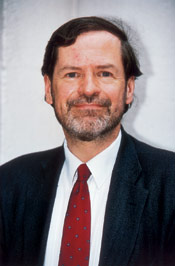
Professor John Waddington (Royal College of Surgeons in Ireland), born in Liverpool in 1952, is Professor of Neuroscience in the Department of Clinical Pharmacology in the Royal College of Surgeons in Ireland. His research in both pre-clinical and clinical neuroscience has been widely recognised both within Ireland and internationally. His work has added substantially to our understanding of the biology and pharmacology of schizophrenia and related illnesses, particularly the early developmental origins of psychotic illness, the relationship of cognitive impairment to movement disorder, and elucidating the functions of brain sites at which antipsychotic drugs act. His scientific papers have appeared in all the leading psychiatric journals together with internationally prestigious journals such as Nature, Science, British Medical Journal and Lancet.
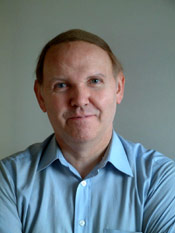
Professor James Walters (QUB), born in Belfast in 1944, is Professor of Theoretical Physics in the Department of Applied Mathematics at Queen's University Belfast. His research is primarily in the area of theoretical and computational atomic and molecular physics, although he has also published papers on high energy physics and chemical engineering. He is one of the foremost experts on coincidence studies of ionisation and atomic collisions involving antimatter.
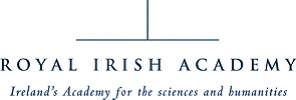
Contact: Pauric Dempsey, Royal Irish Academy/Acadamh R�oga na h�ireann, 19 Dawson Street, Dublin 2; Tel: 01-6762570; E-Mail: [email protected] ; Web: www.ria.ie